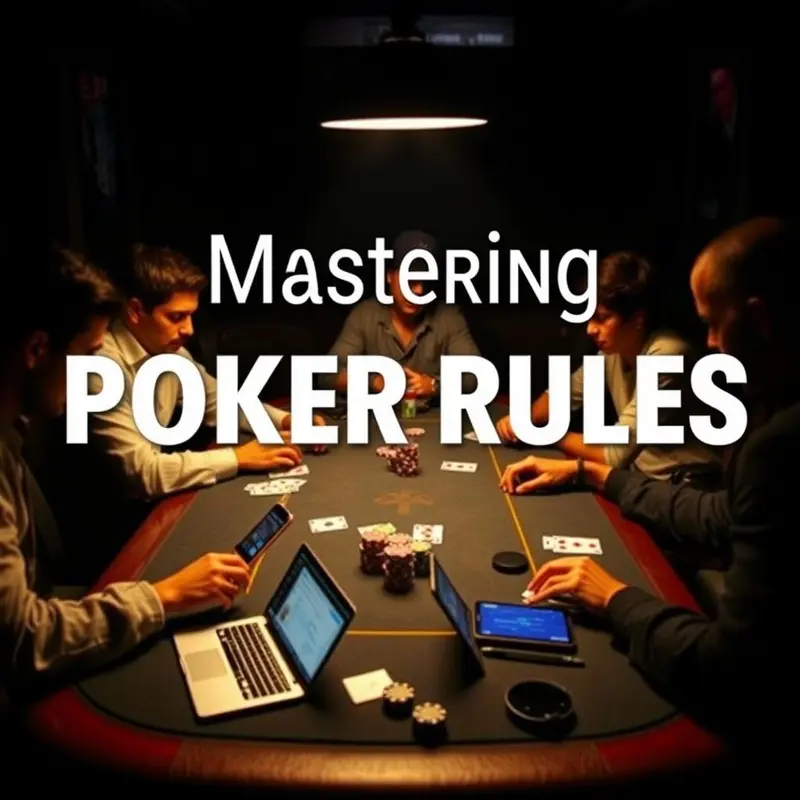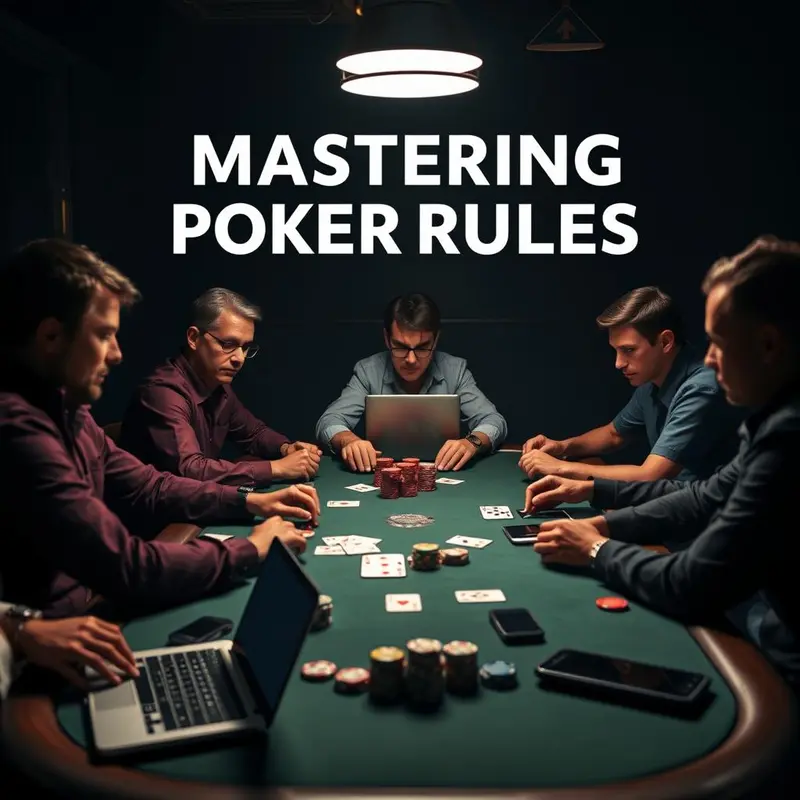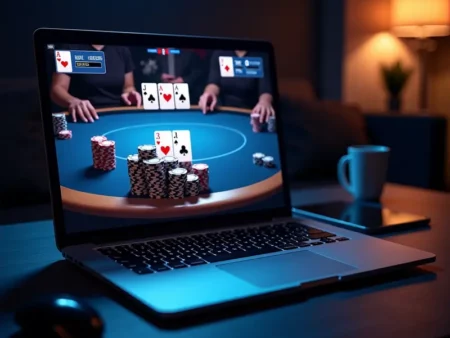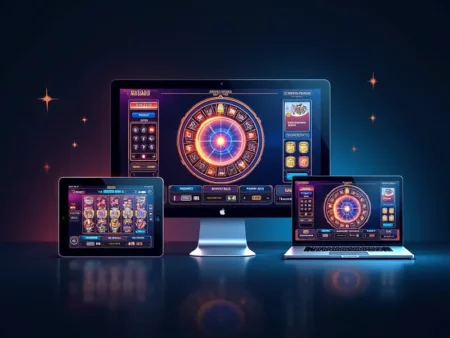Poker. It’s that classic showdown of skill, guts, and a little bit of luck. And online? It’s not just popular; it’s a full-on digital warzone where millions clash daily. If you’re tired of just clicking buttons and want to actually start stacking chips consistently, then getting the rules down cold isn’t just step one—it’s everything. From knowing whose turn it is to knowing which hand smokes which, locking down these basics will sharpen your instincts and make the game infinitely more fun. This guide is split in two: first, we’ll tear down poker’s engine room—the game types, the moves at the table. Then, we’ll get into the smart strategies that are built on top of those rules, getting you ready to bet with real swagger. Whether you’re a total rookie to the online felt or a seasoned vet looking to patch some leaks in your game, these chapters will show you that knowing the rules is what separates the fish from the sharks.
Mastering the Essentials: Core Poker Rules Every Online Player Must Grasp
Look, getting the basic rules of poker isn’t just ‘helpful’; it’s your only way in, especially in the lightning-fast online world. At its raw core, poker is a battle. You win the pot in one of two ways: you either have the best five-card hand when all is said and done, or, more thrillingly, you make everyone else *think* you do, forcing them to muck their cards before you even have to show yours. Yeah, there are a ton of different poker flavors, but the basic pulse of the game is pretty much the same across the board, and every serious player needs it burned into their memory.
The action kicks off with each player being dealt their own private cards, what the pros call “hole cards.” The number you get depends on the game. Let’s talk Texas Hold’em—the undisputed champ of online poker. In Hold’em, you get two hole cards. These are your secret weapons, for your eyes only, until the final bell. The real drama in Hold’em and similar games explodes with the “community cards” – five cards dealt face-up in the middle of the table that *everyone* gets to use. These shared cards are what turn poker into a strategic minefield of wild swings and brilliant bluffs.
As a hand plays out, you’ll go through a few rounds of betting. This is where the money builds and where you can send out signals about how strong your hand is (or how much you’re bluffing). Your arsenal of moves includes to check, bet, call, raise, or fold. A check is like saying, “I’m cool, you go,” but you can only do it if no one’s put money in the pot yet in that round. A bet is you throwing chips in, putting the heat on everyone else to match you. A call is you matching someone else’s bet to see the next card. A raise is you upping the stakes, putting the pressure right back on your opponents. And a fold? That’s you making the tough, but often smart, call to toss your hand and live to fight another day, surrendering any claim to the chips in the pot.
The absolute law of the land in poker is the hand ranking system. This is what settles all arguments at the end. From the king of all hands down to nothing, it starts with the mythical Royal Flush—the unbeatable Ace, King, Queen, Jack, and Ten, all of the same suit. Below that, you’ve got a Straight Flush, Four of a Kind, a Full House, a Flush, a Straight, Three of a Kind, Two Pair, One Pair, and if you’ve got nada, just a lonely High Card. This hierarchy is your North Star; it guides every single move you make.
Let’s stick with Texas Hold’em as our main example. The way the community cards come out gives the game its rhythm. After you get your two hole cards, you see the “flop” – three community cards hitting the table at once. Then comes the “turn,” the fourth community card, and finally the “river,” the fifth and final card. Through these streets, you’re constantly recalculating, trying to piece together the best possible five-card hand using your two secret cards and the five shared ones. These betting rounds are where the real mind games happen, where you try to get a read on your opponents’ souls by how they act.
Where you’re sitting at the table, your “position,” is a massive, massive advantage or disadvantage. The dealer button, which rotates one spot to the left after every hand, sets the order of play. And here’s the golden rule: acting last is a huge power trip. Why? Because you get to see what everyone else does before you have to make your move. The betting usually gets kicked off by the players to the left of the “blinds”—these are small, forced bets that get some money in the pot from the jump. Most games have a small blind and a big blind.
Sometimes, especially in tournaments, you’ll also run into “antes.” These are tiny bets every single player has to chuck in before the cards are even dealt. They keep the pot from getting stagnant and stop people from playing too timidly. You have to be aware of these forced bets and adjust your game accordingly.
And a quick word on online poker etiquette (which is really just about not being a jerk): act when it’s your turn. The software will force you to anyway, so your job is to focus and make a decision in a reasonable time. Acting out of turn or taking forever just messes up the game for everyone.
For those of you ready to graduate from the basics, understanding the different betting structures is like unlocking a whole new level. No-Limit games are the Wild West – you can shove all your chips in at any moment, which leads to explosive, heart-pounding action. Limit games are more like a strategic chess match, with fixed bet sizes that demand patience and precision. And Pot-Limit games? They’re a cool middle ground, letting you bet or raise up to whatever’s in the pot, perfectly balancing aggression and control.
Really getting these fundamentals deep in your bones is what gives you the power to make smart, confident moves at the online tables. It also shows you respect the game and the other players. This knowledge isn’t just the first step; it’s the most crucial step to mastering the deeper strategies and truly enjoying the rich, competitive world that poker offers.
For more insights into playing card games online for real money, including poker strategies and responsible gaming tips, check out this comprehensive guide on online card games.
Navigating the Digital Shuffle: How Poker Rules Evolve in Online Play
Switching from a live poker room to an online table is more than just a change of venue—it’s like jumping from a go-kart to a rocket ship. The game fundamentally changes. Sure, the main goal and what hand beats what stay the same, but the speed, the strategy, and how you deal with other players are all completely different in the digital world.
The first thing that’ll hit you in online poker is the insane pace. In a live game, you can lean back, ponder, and try to stare into your opponent’s soul. Online? You’re on a shot clock. The game forces you to make decisions quickly to keep the action moving. This is awesome for getting more hands in, but it also means you have way less time to size up the situation. If that timer hits zero before you act, the system will often just fold your hand for you. Getting used to this breakneck rhythm is absolutely crucial.
How the cards get dealt is also a different beast. In a live game, you’re trusting a human dealer to shuffle the deck properly. Online, poker sites use super-complex, cryptographically secure Random Number Generation (RNG) algorithms to make sure every single deal is as random as humanly (or digitally) possible. These systems are constantly audited by third parties to prevent any kind of funny business, which is how they build player trust that the game isn’t rigged.
Another huge, game-changing difference is the complete lack of physical “tells.” In a live game, you can pick up on so much from your opponents—a nervous eye twitch, the way they handle their chips, a slight change in their breathing. Online? All of that is gone. Poof. You have to learn to read “digital tells” instead. This means becoming a master of spotting patterns in how people bet, how quickly they act, and using the stats provided by tracking software. Many serious online players use “Heads-Up Displays” (HUDs) that overlay real-time stats on their opponents right onto the table, making data analysis a massive part of the modern online game.
Managing your money also gets way more complicated online. The ease of jumping between tables and stakes means players can “multi-table,” often juggling five, ten, or even more games at once. While this is a fantastic way for skilled players to rack up more hands and potentially earn more, it’s also incredibly risky. It’s easy to get overwhelmed, spread yourself too thin, or completely misjudge the competition at one of your many tables. Your online bankroll strategy has to be much more robust to account for this wider range of stakes and skill levels. For example, the micro-stakes tables are often full of beginners making wild plays, so you can be more aggressive. But the high-stakes games? They’re shark-infested waters, full of seasoned pros who will eat you alive if you’re not playing a cautious, mentally tough game.
Because of all this, the strategic game online is always shifting. The mental pressure at higher stakes is intense, and mistakes are punished brutally. You absolutely have to be able to switch gears and tailor your approach to the level you’re playing at. A bluff that works like a charm on a newbie might be a complete and utter disaster against an expert who’s an expert at spotting patterns.
Your tech skills almost become another part of your poker skill set online. You have to be comfortable with the software – zipping around the betting controls, using the chat features, and quickly reviewing your past hands. Being good with these digital tools can honestly be just as important as your actual card strategy. And multi-tabling? That takes an insane amount of focus and the ability to spot patterns across several different games at once—a skill you almost never need in a live casino.
Finally, keeping the game honest is a top priority for all legitimate online platforms. They use sophisticated anti-collusion programs and are constantly monitoring for weird betting patterns to sniff out and ban cheaters. These security measures are what keep the virtual game as fair as a live one, and that’s vital for keeping the community’s trust.
Embracing these differences is what separates someone who just plays online poker from someone who actually *masters* it. The way the game has evolved online demands a proactive, adaptable mindset that blends quick thinking, data-driven analysis, disciplined bankroll management, and some real tech savvy. For players who want to thrive in this fast-paced world, understanding how the traditional rules have been adapted for the digital shuffle is the key to playing with real confidence.
To deepen your knowledge on adapting to online poker’s unique characteristics, exploring detailed resources on poker rules online will provide practical insights and techniques tailored to the digital arena.
Final thoughts
Getting a solid grip on poker rules isn’t just about memorizing a list; it’s about internalizing the very mechanics of the game so you can unlock your full potential at the online tables. When you truly master the core concepts like hand rankings, betting actions, and the immense power of your position, you’re building a powerful foundation for effective strategy. Moving to online poker adds new wrinkles, like a faster pace and the need for digital savvy, but those fundamental principles are what will always guide you to good decisions. With this knowledge, you’re far better equipped to hit the virtual tables with confidence and clarity. A firm understanding of the rules doesn’t just up your chances of winning; it makes the entire poker experience richer, more engaging, and a hell of a lot more rewarding.
Ready to Elevate Your Gambling Experience to the Next Level? Contact www.topgamb.com today and let our expert team guide you to a more exciting betting adventure with top-notch tips and picks just for YOU! Discover your Winning Edge now!
Learn more: https://www.topgamb.com/casino-rankings/
About us
The website TopGamb.Com is a trusted online casino review and ranking site dedicated to helping users find the best online gaming options. The site provides unbiased reviews, expert rankings, and comprehensive guides to help users make informed decisions. For example, it ranks different online casinos based on factors such as their user-friendliness, variety of games, and payout rates.















